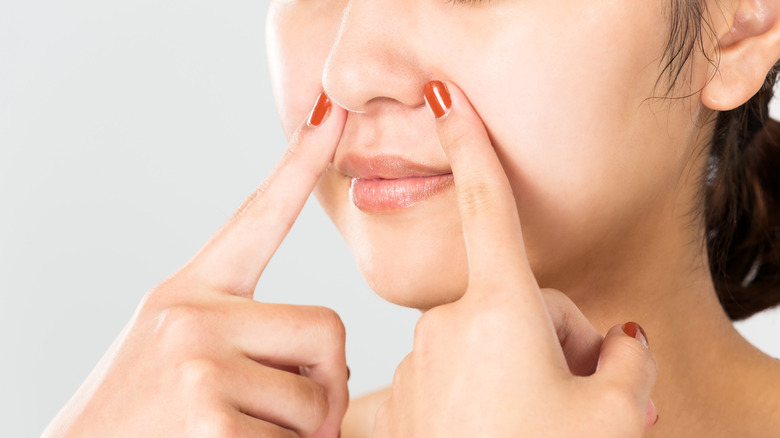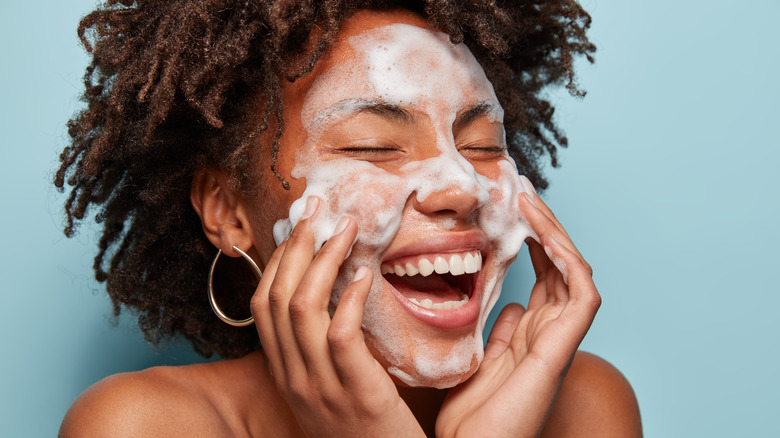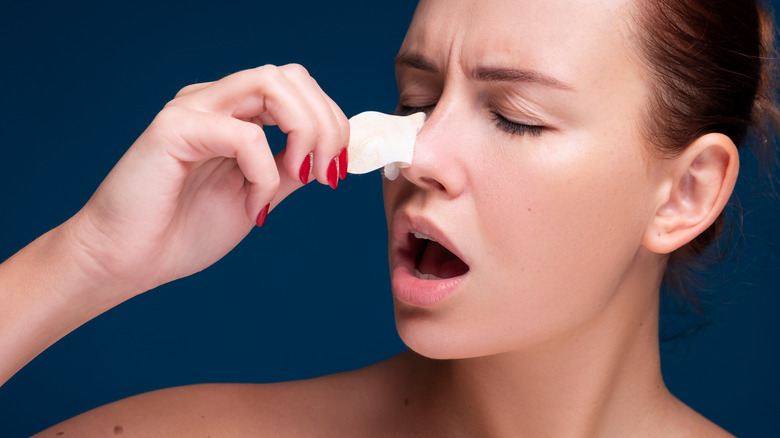How To Reduce The Appearance Of Blackheads On Your Nose
Even if Dr. Sandra Lee, M.D. — more commonly known as Dr. Pimple Popper — makes removing blackheads look easy on TLC, that doesn't mean you should give it a go at home. Board-certified dermatologist Anna Guanche acknowledges "It is very tempting to squeeze blackheads," while also warning that taking extractions into your own hands (literally) can cause long-term damage to your skin, per Insider.
Guanche explained, "Blackheads are dilated pores filled with keratin or dead skin cells. When the cells dry at the top and are exposed to oxygen, they oxidize, turning black." Whiteheads, on the other hand, never oxidize, per Healthline. If you have a habit of picking at these blemishes, you may find that they quickly grow inflamed — ultimately, digging your dirty fingers into your face just isn't the way to go.
According to Healthline, certain factors increase your chances of getting blackheads. Hormonal changes during teenage years, for instance, often lead to increased oil production and clogged pores. Diet could have an impact on them too, but experts are split on whether eating too much dairy, for example, triggers blackheads. Keep in mind, though, not only are these "open comedones" common, they're inevitable.
Almost everyone gets blackheads at some point in their lives, per Cleveland Clinic. Given how ubiquitous they are, there's no shortage of blackhead treatments on the market. You just have to know where to look — most likely in the aisles of your local pharmacy.
Change up your cleansing routine
First and foremost, dermatologist Joshua Zeichner, MD recommends adding salicylic acid to your cleansing routine, per Byrdie. Cleansers containing this ingredient will help clear up any excess oil, preventing your pores from clogging. As well as reducing the sebum that causes blackheads, over-the-counter salicylic acid products work as exfoliants, removing dead skin cells too.
As board-certified dermatologist Naissan O. Wesley told Allure, this chemical "dissolves skin debris that clogs pores, [acts] as an anti-inflammatory, and also helps red, inflamed pimples and pustules go away faster." Further, Dr. Shuting Hu confirmed to InStyle that salicylic acid cleansers are safe to use once a day. However, coarse exfoliating products containing this ingredient should be used no more than three times per week.
Alternatively, try a chemical peel to avoid creating small tears in your skin's barrier (via Glamour). If you have sensitive skin, use salicylic acid products with caution. "Depending on the concentration and the number of applications, some people may experience dryness, peeling, redness, and some skin irritation," Dr. Randy Schueller warned Allure.
Typically, over-the-counter salicylic acid cleansers come in concentrations of 2% but, for some, this might prove too potent. According to dermatologist Deanne Mraz Robinson, M.D., harsh face washes sometimes result in an overproduction of sebum if too much moisture is stripped from the skin, as she told Glamour. Drugstore cleansers are ideal to use twice a day or after a sweaty workout, but cleansing your skin regularly helps prevent future blemishes regardless.
Pore strips are only a temporary solution
Pore strips are intensely satisfying, but they're not a long-term method of reducing the appearance of blackheads. The adhesive attaches to your sebaceous filaments and, although it will remove gunk, it also creates an opening for pores to quickly refill (via Healthline). Unlike salicylic acid, you'll see immediate — albeit, short-lived — results from these strips. However, it won't be long before blackheads reappear on your nose.
Face masks are a great alternative to pore strips, according to Byrdie. Dr. Claire Wolinsky recommends kaolin clay masks, products that work by absorbing excess sebum without irritating sensitive skin. Bentonite clay masks, such as the viral Aztec healing clay, have both anti-inflammatory and drying qualities, and are especially potent when combined with apple cider vinegar. For best results, and to avoid dehydrating your skin, avoid using bentonite products more than once a week.
For the best long-term results, invest in topical retinoid solutions to treat your blackheads. As Dr. Kathleen Cook Suozzi told Everyday Health, "Retinoids work by promoting skin turnover and decreasing the 'stickiness' of the skin cells to prevent blockage of the follicular ostia." When using retinoids, prescription or otherwise, you may notice blackheads getting worse before they get better. "However, with continued treatment, the plugged ostia begin to improve, and with skin turnover promoted, they are less likely to become blocked in the future," Suozzi clarified.
Moreover, always use sunscreen. As Healthline notes, sun damage can contribute to excessive blackheads later in life.


